Critical Thinking, Research, and Evidence in Health and Social Care
VerifiedAdded on 2023/06/04
|9
|3011
|268
Report
AI Summary
This report delves into the significance of critical thinking and research methodologies within the realm of health and social care. It explores the importance of evidence-based practice in healthcare decision-making, emphasizing the use of critical thinking skills in analyzing information from various sources, including research findings, clinical experience, and patient preferences. The report discusses the application of both qualitative and quantitative research methodologies for service improvement, highlighting the value of critical thinking in the context of mental health approaches. Furthermore, it examines the different types of critical thinking skills, such as identifying biases, inference, research, identification, curiosity, and judging relevance, and their roles in evidence-based practice. The report also highlights the benefits of evidence-based practice in improving the quality of care, enhancing patient satisfaction, and reducing the research-practice gap. Overall, this report provides a comprehensive overview of the critical components of evidence-based practice in health and social care, emphasizing the importance of critical thinking and research skills for informed decision-making and service improvement.
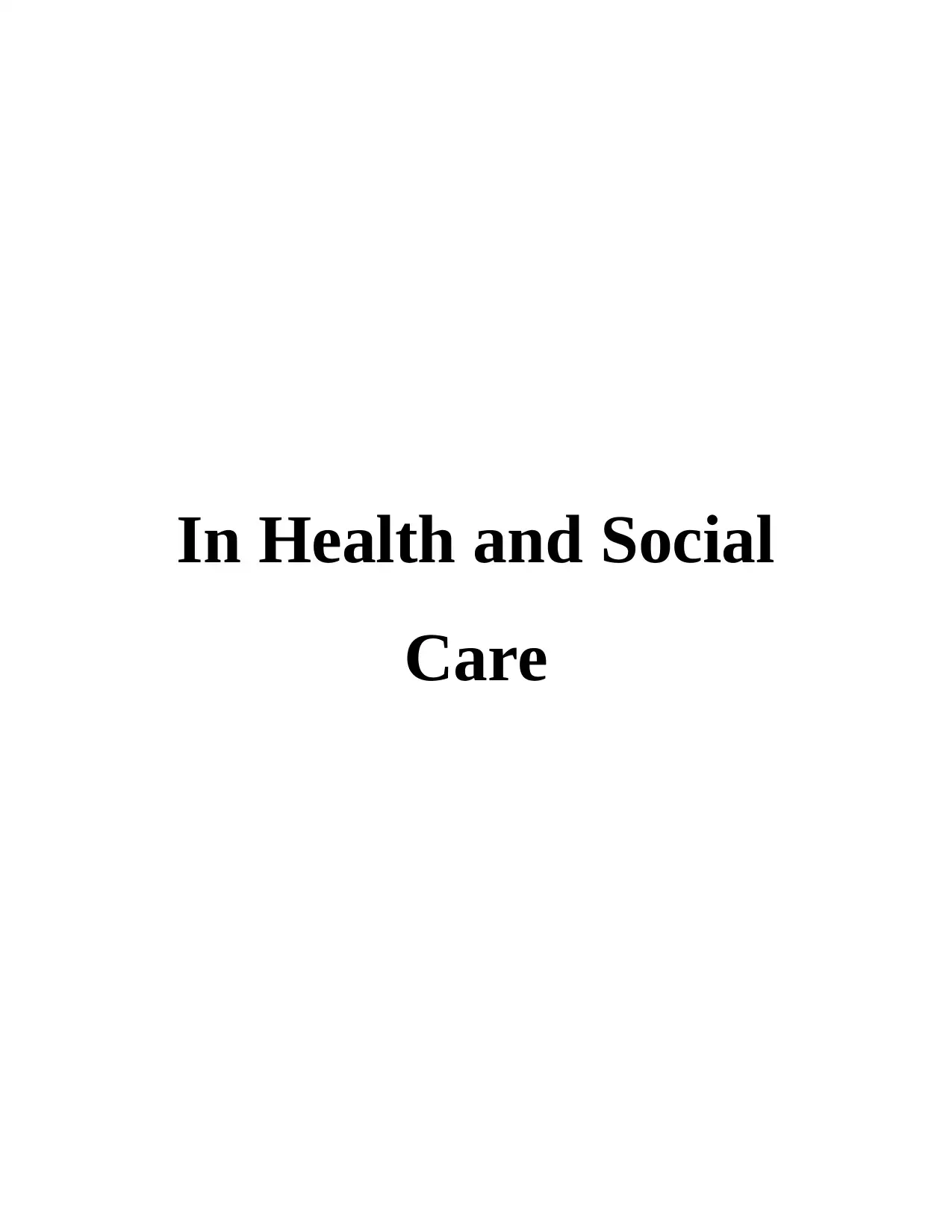
In Health and Social
Care
Care
Paraphrase This Document
Need a fresh take? Get an instant paraphrase of this document with our AI Paraphraser
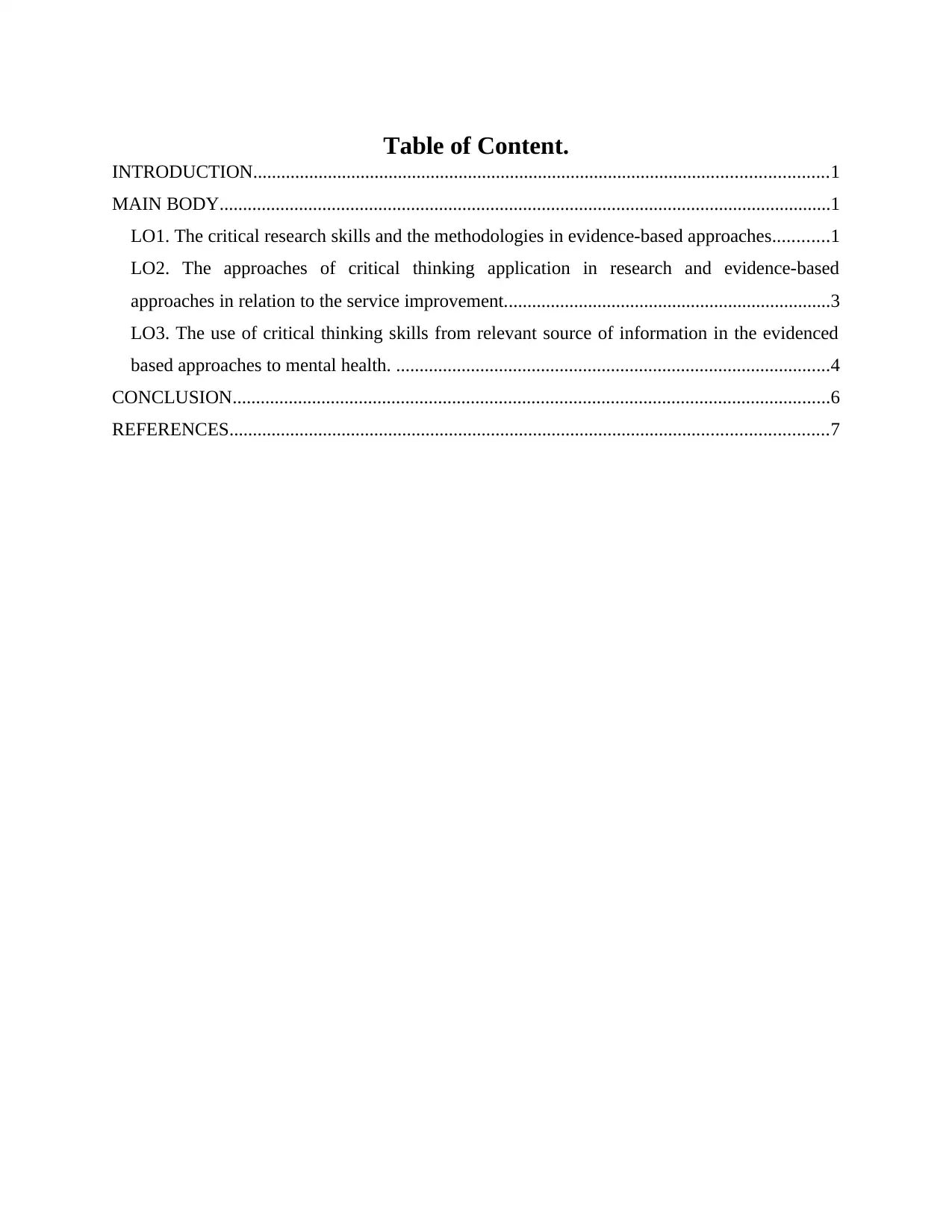
Table of Content.
INTRODUCTION...........................................................................................................................1
MAIN BODY...................................................................................................................................1
LO1. The critical research skills and the methodologies in evidence-based approaches............1
LO2. The approaches of critical thinking application in research and evidence-based
approaches in relation to the service improvement......................................................................3
LO3. The use of critical thinking skills from relevant source of information in the evidenced
based approaches to mental health. .............................................................................................4
CONCLUSION................................................................................................................................6
REFERENCES................................................................................................................................7
INTRODUCTION...........................................................................................................................1
MAIN BODY...................................................................................................................................1
LO1. The critical research skills and the methodologies in evidence-based approaches............1
LO2. The approaches of critical thinking application in research and evidence-based
approaches in relation to the service improvement......................................................................3
LO3. The use of critical thinking skills from relevant source of information in the evidenced
based approaches to mental health. .............................................................................................4
CONCLUSION................................................................................................................................6
REFERENCES................................................................................................................................7
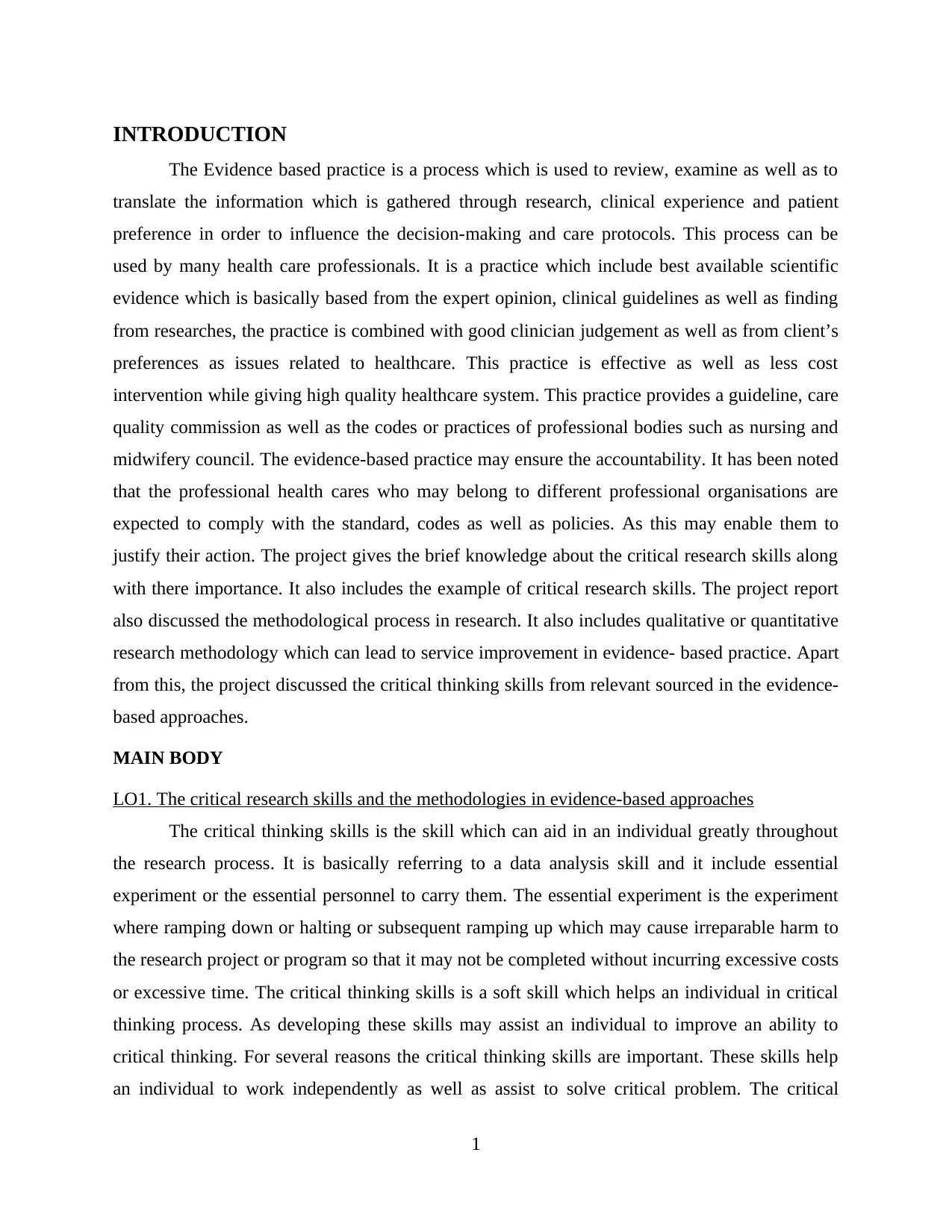
INTRODUCTION
The Evidence based practice is a process which is used to review, examine as well as to
translate the information which is gathered through research, clinical experience and patient
preference in order to influence the decision-making and care protocols. This process can be
used by many health care professionals. It is a practice which include best available scientific
evidence which is basically based from the expert opinion, clinical guidelines as well as finding
from researches, the practice is combined with good clinician judgement as well as from client’s
preferences as issues related to healthcare. This practice is effective as well as less cost
intervention while giving high quality healthcare system. This practice provides a guideline, care
quality commission as well as the codes or practices of professional bodies such as nursing and
midwifery council. The evidence-based practice may ensure the accountability. It has been noted
that the professional health cares who may belong to different professional organisations are
expected to comply with the standard, codes as well as policies. As this may enable them to
justify their action. The project gives the brief knowledge about the critical research skills along
with there importance. It also includes the example of critical research skills. The project report
also discussed the methodological process in research. It also includes qualitative or quantitative
research methodology which can lead to service improvement in evidence- based practice. Apart
from this, the project discussed the critical thinking skills from relevant sourced in the evidence-
based approaches.
MAIN BODY
LO1. The critical research skills and the methodologies in evidence-based approaches
The critical thinking skills is the skill which can aid in an individual greatly throughout
the research process. It is basically referring to a data analysis skill and it include essential
experiment or the essential personnel to carry them. The essential experiment is the experiment
where ramping down or halting or subsequent ramping up which may cause irreparable harm to
the research project or program so that it may not be completed without incurring excessive costs
or excessive time. The critical thinking skills is a soft skill which helps an individual in critical
thinking process. As developing these skills may assist an individual to improve an ability to
critical thinking. For several reasons the critical thinking skills are important. These skills help
an individual to work independently as well as assist to solve critical problem. The critical
1
The Evidence based practice is a process which is used to review, examine as well as to
translate the information which is gathered through research, clinical experience and patient
preference in order to influence the decision-making and care protocols. This process can be
used by many health care professionals. It is a practice which include best available scientific
evidence which is basically based from the expert opinion, clinical guidelines as well as finding
from researches, the practice is combined with good clinician judgement as well as from client’s
preferences as issues related to healthcare. This practice is effective as well as less cost
intervention while giving high quality healthcare system. This practice provides a guideline, care
quality commission as well as the codes or practices of professional bodies such as nursing and
midwifery council. The evidence-based practice may ensure the accountability. It has been noted
that the professional health cares who may belong to different professional organisations are
expected to comply with the standard, codes as well as policies. As this may enable them to
justify their action. The project gives the brief knowledge about the critical research skills along
with there importance. It also includes the example of critical research skills. The project report
also discussed the methodological process in research. It also includes qualitative or quantitative
research methodology which can lead to service improvement in evidence- based practice. Apart
from this, the project discussed the critical thinking skills from relevant sourced in the evidence-
based approaches.
MAIN BODY
LO1. The critical research skills and the methodologies in evidence-based approaches
The critical thinking skills is the skill which can aid in an individual greatly throughout
the research process. It is basically referring to a data analysis skill and it include essential
experiment or the essential personnel to carry them. The essential experiment is the experiment
where ramping down or halting or subsequent ramping up which may cause irreparable harm to
the research project or program so that it may not be completed without incurring excessive costs
or excessive time. The critical thinking skills is a soft skill which helps an individual in critical
thinking process. As developing these skills may assist an individual to improve an ability to
critical thinking. For several reasons the critical thinking skills are important. These skills help
an individual to work independently as well as assist to solve critical problem. The critical
1
⊘ This is a preview!⊘
Do you want full access?
Subscribe today to unlock all pages.

Trusted by 1+ million students worldwide
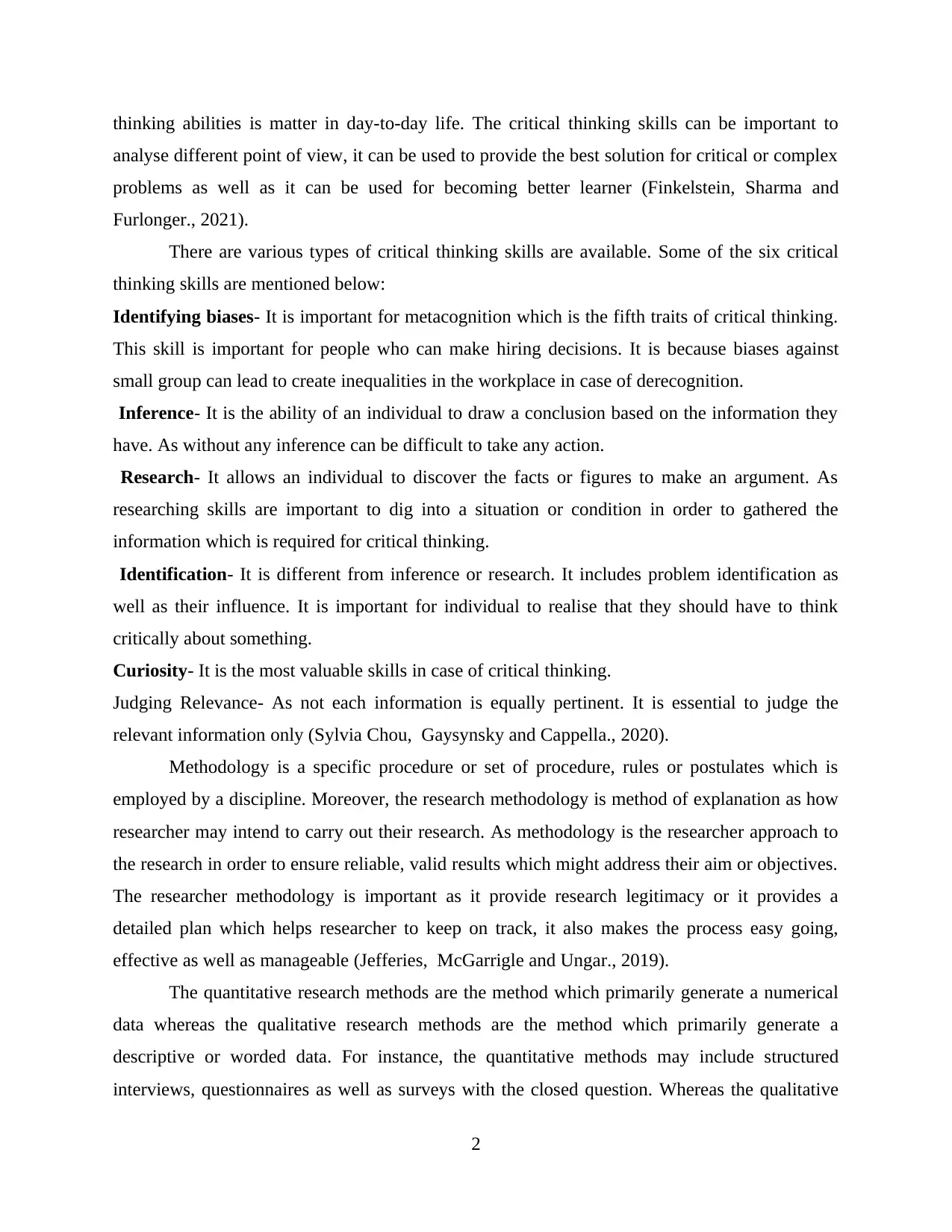
thinking abilities is matter in day-to-day life. The critical thinking skills can be important to
analyse different point of view, it can be used to provide the best solution for critical or complex
problems as well as it can be used for becoming better learner (Finkelstein, Sharma and
Furlonger., 2021).
There are various types of critical thinking skills are available. Some of the six critical
thinking skills are mentioned below:
Identifying biases- It is important for metacognition which is the fifth traits of critical thinking.
This skill is important for people who can make hiring decisions. It is because biases against
small group can lead to create inequalities in the workplace in case of derecognition.
Inference- It is the ability of an individual to draw a conclusion based on the information they
have. As without any inference can be difficult to take any action.
Research- It allows an individual to discover the facts or figures to make an argument. As
researching skills are important to dig into a situation or condition in order to gathered the
information which is required for critical thinking.
Identification- It is different from inference or research. It includes problem identification as
well as their influence. It is important for individual to realise that they should have to think
critically about something.
Curiosity- It is the most valuable skills in case of critical thinking.
Judging Relevance- As not each information is equally pertinent. It is essential to judge the
relevant information only (Sylvia Chou, Gaysynsky and Cappella., 2020).
Methodology is a specific procedure or set of procedure, rules or postulates which is
employed by a discipline. Moreover, the research methodology is method of explanation as how
researcher may intend to carry out their research. As methodology is the researcher approach to
the research in order to ensure reliable, valid results which might address their aim or objectives.
The researcher methodology is important as it provide research legitimacy or it provides a
detailed plan which helps researcher to keep on track, it also makes the process easy going,
effective as well as manageable (Jefferies, McGarrigle and Ungar., 2019).
The quantitative research methods are the method which primarily generate a numerical
data whereas the qualitative research methods are the method which primarily generate a
descriptive or worded data. For instance, the quantitative methods may include structured
interviews, questionnaires as well as surveys with the closed question. Whereas the qualitative
2
analyse different point of view, it can be used to provide the best solution for critical or complex
problems as well as it can be used for becoming better learner (Finkelstein, Sharma and
Furlonger., 2021).
There are various types of critical thinking skills are available. Some of the six critical
thinking skills are mentioned below:
Identifying biases- It is important for metacognition which is the fifth traits of critical thinking.
This skill is important for people who can make hiring decisions. It is because biases against
small group can lead to create inequalities in the workplace in case of derecognition.
Inference- It is the ability of an individual to draw a conclusion based on the information they
have. As without any inference can be difficult to take any action.
Research- It allows an individual to discover the facts or figures to make an argument. As
researching skills are important to dig into a situation or condition in order to gathered the
information which is required for critical thinking.
Identification- It is different from inference or research. It includes problem identification as
well as their influence. It is important for individual to realise that they should have to think
critically about something.
Curiosity- It is the most valuable skills in case of critical thinking.
Judging Relevance- As not each information is equally pertinent. It is essential to judge the
relevant information only (Sylvia Chou, Gaysynsky and Cappella., 2020).
Methodology is a specific procedure or set of procedure, rules or postulates which is
employed by a discipline. Moreover, the research methodology is method of explanation as how
researcher may intend to carry out their research. As methodology is the researcher approach to
the research in order to ensure reliable, valid results which might address their aim or objectives.
The researcher methodology is important as it provide research legitimacy or it provides a
detailed plan which helps researcher to keep on track, it also makes the process easy going,
effective as well as manageable (Jefferies, McGarrigle and Ungar., 2019).
The quantitative research methods are the method which primarily generate a numerical
data whereas the qualitative research methods are the method which primarily generate a
descriptive or worded data. For instance, the quantitative methods may include structured
interviews, questionnaires as well as surveys with the closed question. Whereas the qualitative
2
Paraphrase This Document
Need a fresh take? Get an instant paraphrase of this document with our AI Paraphraser
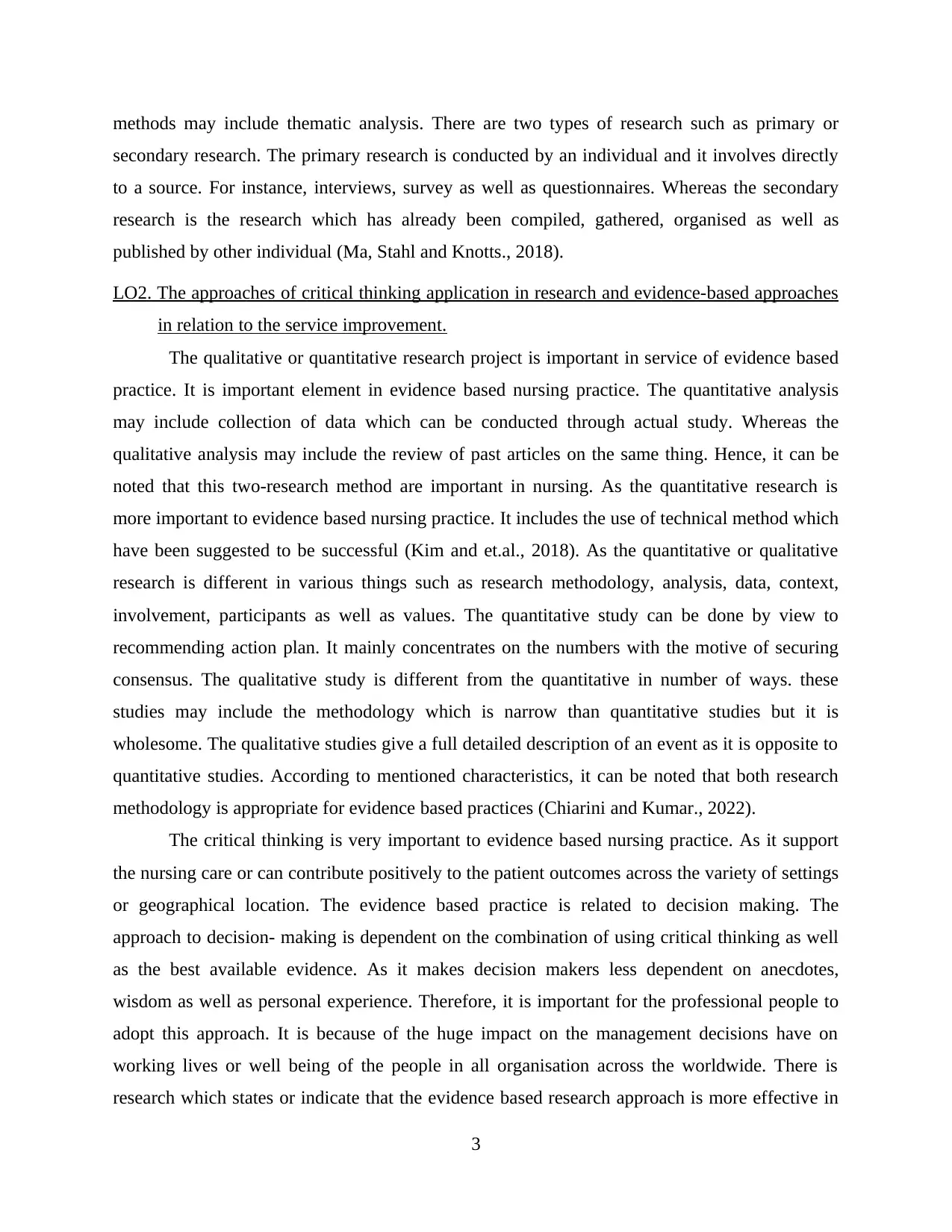
methods may include thematic analysis. There are two types of research such as primary or
secondary research. The primary research is conducted by an individual and it involves directly
to a source. For instance, interviews, survey as well as questionnaires. Whereas the secondary
research is the research which has already been compiled, gathered, organised as well as
published by other individual (Ma, Stahl and Knotts., 2018).
LO2. The approaches of critical thinking application in research and evidence-based approaches
in relation to the service improvement.
The qualitative or quantitative research project is important in service of evidence based
practice. It is important element in evidence based nursing practice. The quantitative analysis
may include collection of data which can be conducted through actual study. Whereas the
qualitative analysis may include the review of past articles on the same thing. Hence, it can be
noted that this two-research method are important in nursing. As the quantitative research is
more important to evidence based nursing practice. It includes the use of technical method which
have been suggested to be successful (Kim and et.al., 2018). As the quantitative or qualitative
research is different in various things such as research methodology, analysis, data, context,
involvement, participants as well as values. The quantitative study can be done by view to
recommending action plan. It mainly concentrates on the numbers with the motive of securing
consensus. The qualitative study is different from the quantitative in number of ways. these
studies may include the methodology which is narrow than quantitative studies but it is
wholesome. The qualitative studies give a full detailed description of an event as it is opposite to
quantitative studies. According to mentioned characteristics, it can be noted that both research
methodology is appropriate for evidence based practices (Chiarini and Kumar., 2022).
The critical thinking is very important to evidence based nursing practice. As it support
the nursing care or can contribute positively to the patient outcomes across the variety of settings
or geographical location. The evidence based practice is related to decision making. The
approach to decision- making is dependent on the combination of using critical thinking as well
as the best available evidence. As it makes decision makers less dependent on anecdotes,
wisdom as well as personal experience. Therefore, it is important for the professional people to
adopt this approach. It is because of the huge impact on the management decisions have on
working lives or well being of the people in all organisation across the worldwide. There is
research which states or indicate that the evidence based research approach is more effective in
3
secondary research. The primary research is conducted by an individual and it involves directly
to a source. For instance, interviews, survey as well as questionnaires. Whereas the secondary
research is the research which has already been compiled, gathered, organised as well as
published by other individual (Ma, Stahl and Knotts., 2018).
LO2. The approaches of critical thinking application in research and evidence-based approaches
in relation to the service improvement.
The qualitative or quantitative research project is important in service of evidence based
practice. It is important element in evidence based nursing practice. The quantitative analysis
may include collection of data which can be conducted through actual study. Whereas the
qualitative analysis may include the review of past articles on the same thing. Hence, it can be
noted that this two-research method are important in nursing. As the quantitative research is
more important to evidence based nursing practice. It includes the use of technical method which
have been suggested to be successful (Kim and et.al., 2018). As the quantitative or qualitative
research is different in various things such as research methodology, analysis, data, context,
involvement, participants as well as values. The quantitative study can be done by view to
recommending action plan. It mainly concentrates on the numbers with the motive of securing
consensus. The qualitative study is different from the quantitative in number of ways. these
studies may include the methodology which is narrow than quantitative studies but it is
wholesome. The qualitative studies give a full detailed description of an event as it is opposite to
quantitative studies. According to mentioned characteristics, it can be noted that both research
methodology is appropriate for evidence based practices (Chiarini and Kumar., 2022).
The critical thinking is very important to evidence based nursing practice. As it support
the nursing care or can contribute positively to the patient outcomes across the variety of settings
or geographical location. The evidence based practice is related to decision making. The
approach to decision- making is dependent on the combination of using critical thinking as well
as the best available evidence. As it makes decision makers less dependent on anecdotes,
wisdom as well as personal experience. Therefore, it is important for the professional people to
adopt this approach. It is because of the huge impact on the management decisions have on
working lives or well being of the people in all organisation across the worldwide. There is
research which states or indicate that the evidence based research approach is more effective in
3
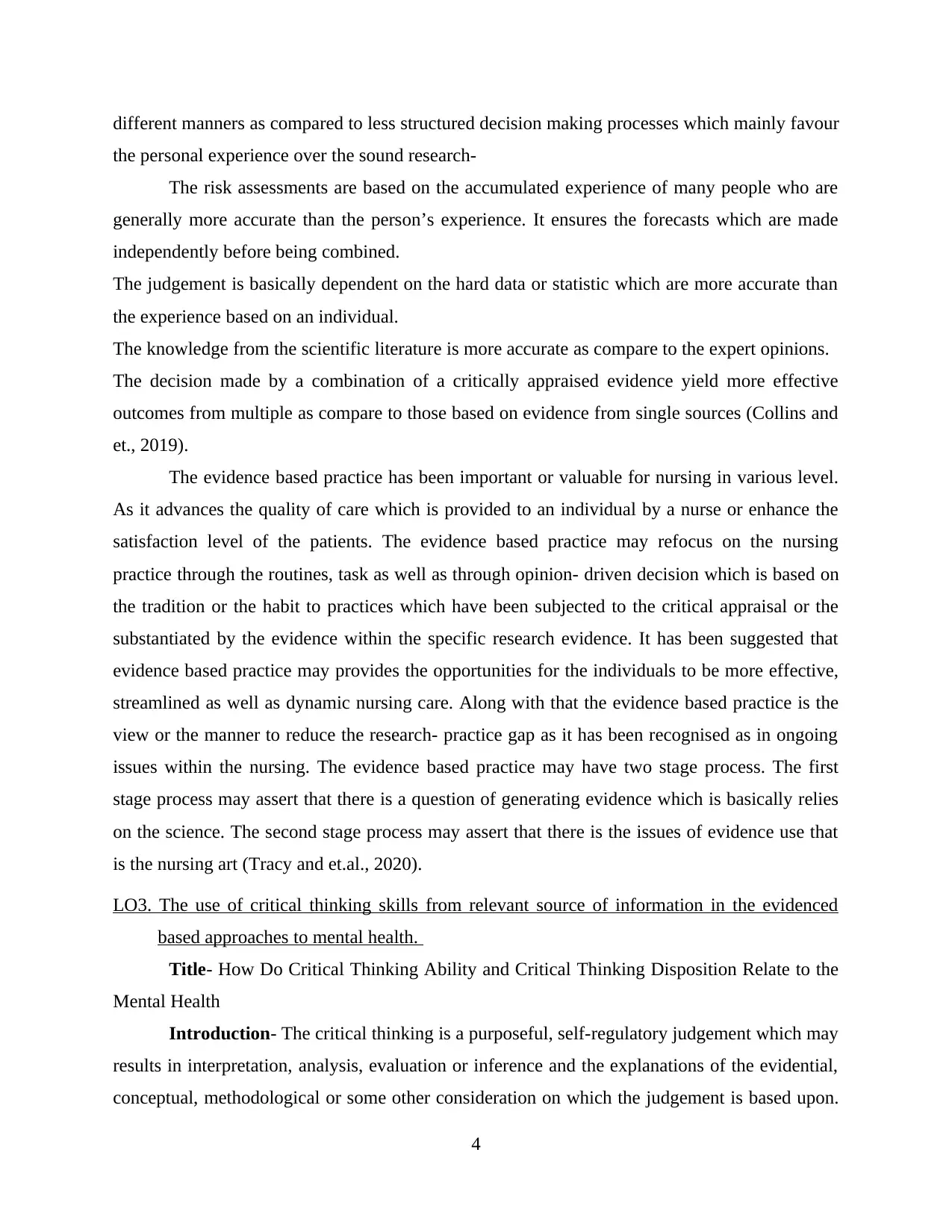
different manners as compared to less structured decision making processes which mainly favour
the personal experience over the sound research-
The risk assessments are based on the accumulated experience of many people who are
generally more accurate than the person’s experience. It ensures the forecasts which are made
independently before being combined.
The judgement is basically dependent on the hard data or statistic which are more accurate than
the experience based on an individual.
The knowledge from the scientific literature is more accurate as compare to the expert opinions.
The decision made by a combination of a critically appraised evidence yield more effective
outcomes from multiple as compare to those based on evidence from single sources (Collins and
et., 2019).
The evidence based practice has been important or valuable for nursing in various level.
As it advances the quality of care which is provided to an individual by a nurse or enhance the
satisfaction level of the patients. The evidence based practice may refocus on the nursing
practice through the routines, task as well as through opinion- driven decision which is based on
the tradition or the habit to practices which have been subjected to the critical appraisal or the
substantiated by the evidence within the specific research evidence. It has been suggested that
evidence based practice may provides the opportunities for the individuals to be more effective,
streamlined as well as dynamic nursing care. Along with that the evidence based practice is the
view or the manner to reduce the research- practice gap as it has been recognised as in ongoing
issues within the nursing. The evidence based practice may have two stage process. The first
stage process may assert that there is a question of generating evidence which is basically relies
on the science. The second stage process may assert that there is the issues of evidence use that
is the nursing art (Tracy and et.al., 2020).
LO3. The use of critical thinking skills from relevant source of information in the evidenced
based approaches to mental health.
Title- How Do Critical Thinking Ability and Critical Thinking Disposition Relate to the
Mental Health
Introduction- The critical thinking is a purposeful, self-regulatory judgement which may
results in interpretation, analysis, evaluation or inference and the explanations of the evidential,
conceptual, methodological or some other consideration on which the judgement is based upon.
4
the personal experience over the sound research-
The risk assessments are based on the accumulated experience of many people who are
generally more accurate than the person’s experience. It ensures the forecasts which are made
independently before being combined.
The judgement is basically dependent on the hard data or statistic which are more accurate than
the experience based on an individual.
The knowledge from the scientific literature is more accurate as compare to the expert opinions.
The decision made by a combination of a critically appraised evidence yield more effective
outcomes from multiple as compare to those based on evidence from single sources (Collins and
et., 2019).
The evidence based practice has been important or valuable for nursing in various level.
As it advances the quality of care which is provided to an individual by a nurse or enhance the
satisfaction level of the patients. The evidence based practice may refocus on the nursing
practice through the routines, task as well as through opinion- driven decision which is based on
the tradition or the habit to practices which have been subjected to the critical appraisal or the
substantiated by the evidence within the specific research evidence. It has been suggested that
evidence based practice may provides the opportunities for the individuals to be more effective,
streamlined as well as dynamic nursing care. Along with that the evidence based practice is the
view or the manner to reduce the research- practice gap as it has been recognised as in ongoing
issues within the nursing. The evidence based practice may have two stage process. The first
stage process may assert that there is a question of generating evidence which is basically relies
on the science. The second stage process may assert that there is the issues of evidence use that
is the nursing art (Tracy and et.al., 2020).
LO3. The use of critical thinking skills from relevant source of information in the evidenced
based approaches to mental health.
Title- How Do Critical Thinking Ability and Critical Thinking Disposition Relate to the
Mental Health
Introduction- The critical thinking is a purposeful, self-regulatory judgement which may
results in interpretation, analysis, evaluation or inference and the explanations of the evidential,
conceptual, methodological or some other consideration on which the judgement is based upon.
4
⊘ This is a preview!⊘
Do you want full access?
Subscribe today to unlock all pages.

Trusted by 1+ million students worldwide
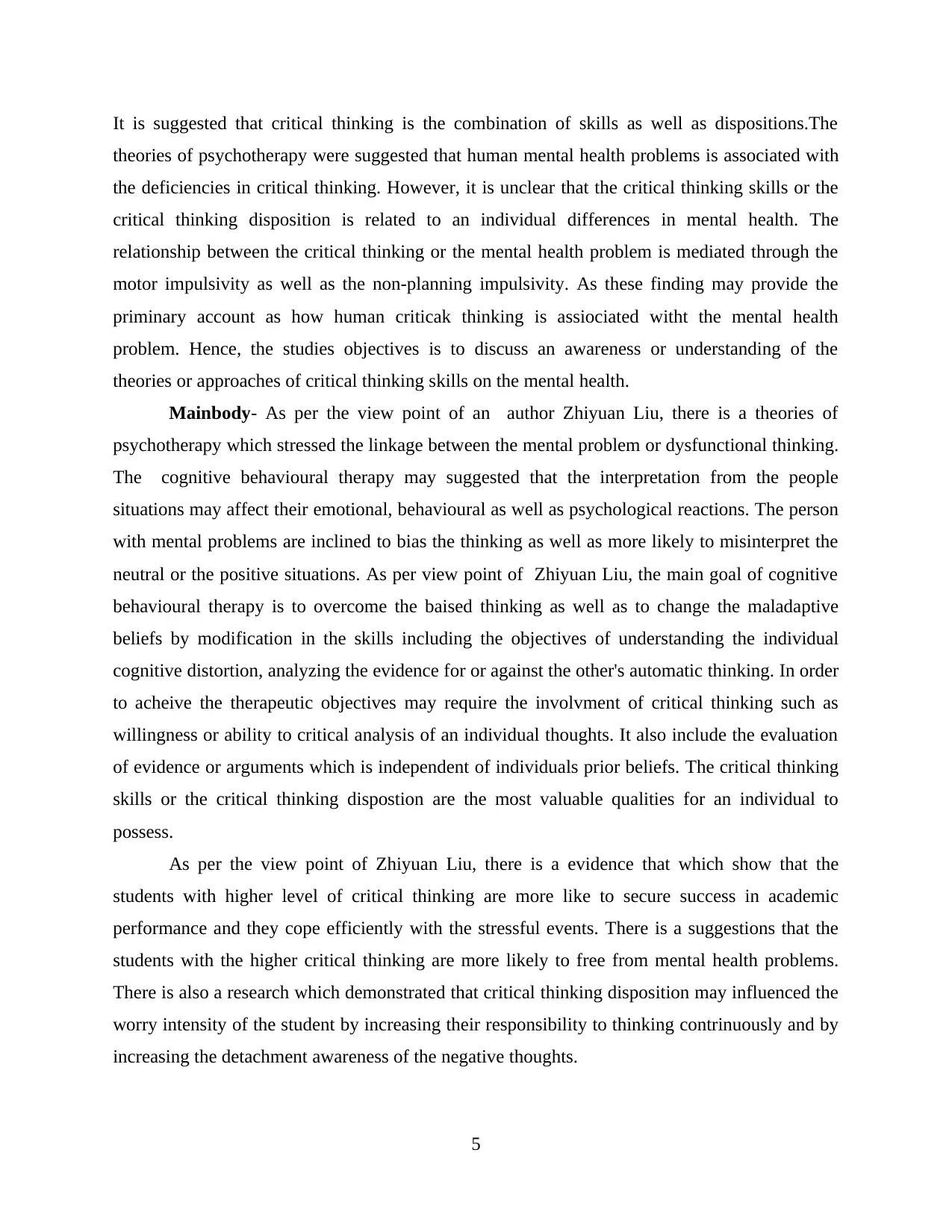
It is suggested that critical thinking is the combination of skills as well as dispositions.The
theories of psychotherapy were suggested that human mental health problems is associated with
the deficiencies in critical thinking. However, it is unclear that the critical thinking skills or the
critical thinking disposition is related to an individual differences in mental health. The
relationship between the critical thinking or the mental health problem is mediated through the
motor impulsivity as well as the non-planning impulsivity. As these finding may provide the
priminary account as how human criticak thinking is assiociated witht the mental health
problem. Hence, the studies objectives is to discuss an awareness or understanding of the
theories or approaches of critical thinking skills on the mental health.
Mainbody- As per the view point of an author Zhiyuan Liu, there is a theories of
psychotherapy which stressed the linkage between the mental problem or dysfunctional thinking.
The cognitive behavioural therapy may suggested that the interpretation from the people
situations may affect their emotional, behavioural as well as psychological reactions. The person
with mental problems are inclined to bias the thinking as well as more likely to misinterpret the
neutral or the positive situations. As per view point of Zhiyuan Liu, the main goal of cognitive
behavioural therapy is to overcome the baised thinking as well as to change the maladaptive
beliefs by modification in the skills including the objectives of understanding the individual
cognitive distortion, analyzing the evidence for or against the other's automatic thinking. In order
to acheive the therapeutic objectives may require the involvment of critical thinking such as
willingness or ability to critical analysis of an individual thoughts. It also include the evaluation
of evidence or arguments which is independent of individuals prior beliefs. The critical thinking
skills or the critical thinking dispostion are the most valuable qualities for an individual to
possess.
As per the view point of Zhiyuan Liu, there is a evidence that which show that the
students with higher level of critical thinking are more like to secure success in academic
performance and they cope efficiently with the stressful events. There is a suggestions that the
students with the higher critical thinking are more likely to free from mental health problems.
There is also a research which demonstrated that critical thinking disposition may influenced the
worry intensity of the student by increasing their responsibility to thinking contrinuously and by
increasing the detachment awareness of the negative thoughts.
5
theories of psychotherapy were suggested that human mental health problems is associated with
the deficiencies in critical thinking. However, it is unclear that the critical thinking skills or the
critical thinking disposition is related to an individual differences in mental health. The
relationship between the critical thinking or the mental health problem is mediated through the
motor impulsivity as well as the non-planning impulsivity. As these finding may provide the
priminary account as how human criticak thinking is assiociated witht the mental health
problem. Hence, the studies objectives is to discuss an awareness or understanding of the
theories or approaches of critical thinking skills on the mental health.
Mainbody- As per the view point of an author Zhiyuan Liu, there is a theories of
psychotherapy which stressed the linkage between the mental problem or dysfunctional thinking.
The cognitive behavioural therapy may suggested that the interpretation from the people
situations may affect their emotional, behavioural as well as psychological reactions. The person
with mental problems are inclined to bias the thinking as well as more likely to misinterpret the
neutral or the positive situations. As per view point of Zhiyuan Liu, the main goal of cognitive
behavioural therapy is to overcome the baised thinking as well as to change the maladaptive
beliefs by modification in the skills including the objectives of understanding the individual
cognitive distortion, analyzing the evidence for or against the other's automatic thinking. In order
to acheive the therapeutic objectives may require the involvment of critical thinking such as
willingness or ability to critical analysis of an individual thoughts. It also include the evaluation
of evidence or arguments which is independent of individuals prior beliefs. The critical thinking
skills or the critical thinking dispostion are the most valuable qualities for an individual to
possess.
As per the view point of Zhiyuan Liu, there is a evidence that which show that the
students with higher level of critical thinking are more like to secure success in academic
performance and they cope efficiently with the stressful events. There is a suggestions that the
students with the higher critical thinking are more likely to free from mental health problems.
There is also a research which demonstrated that critical thinking disposition may influenced the
worry intensity of the student by increasing their responsibility to thinking contrinuously and by
increasing the detachment awareness of the negative thoughts.
5
Paraphrase This Document
Need a fresh take? Get an instant paraphrase of this document with our AI Paraphraser
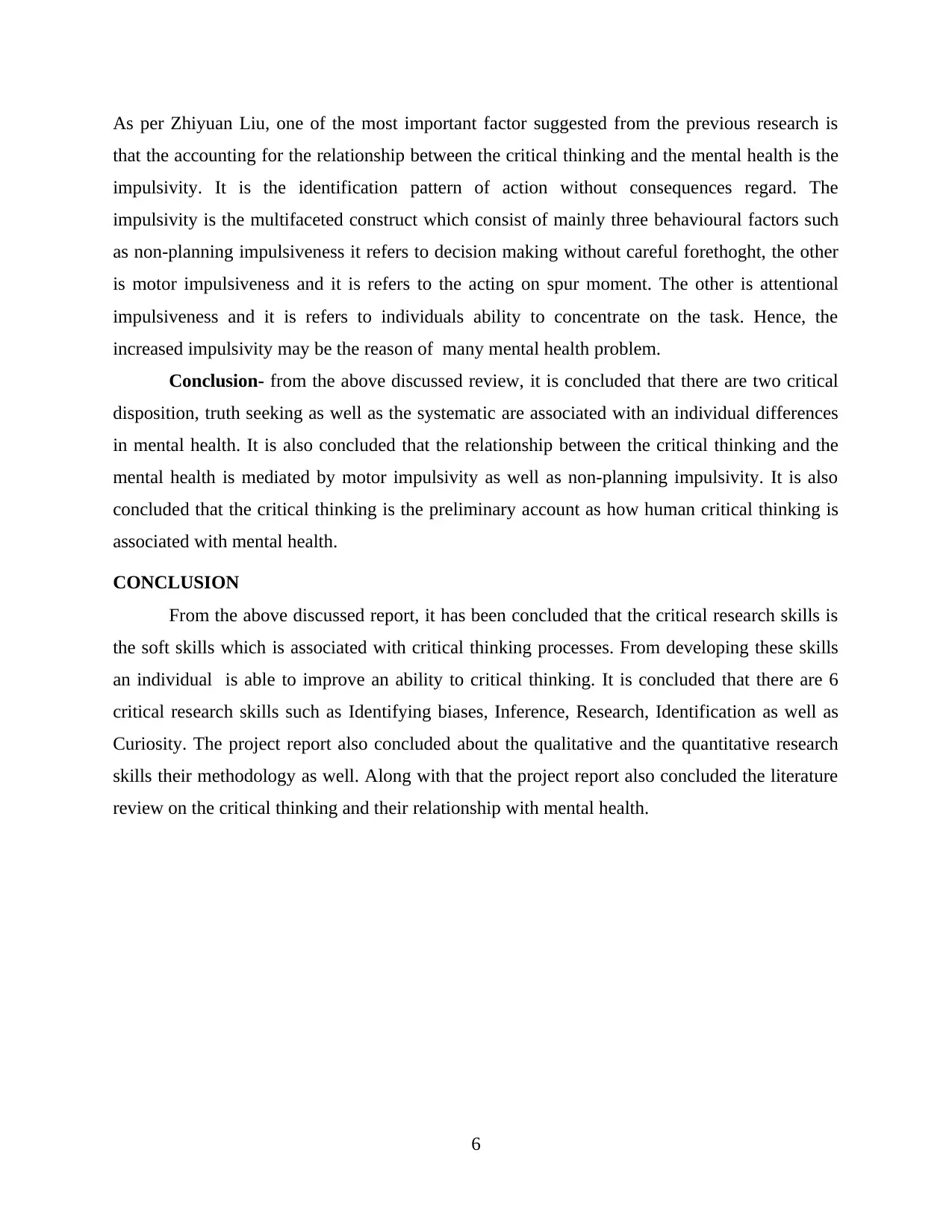
As per Zhiyuan Liu, one of the most important factor suggested from the previous research is
that the accounting for the relationship between the critical thinking and the mental health is the
impulsivity. It is the identification pattern of action without consequences regard. The
impulsivity is the multifaceted construct which consist of mainly three behavioural factors such
as non-planning impulsiveness it refers to decision making without careful forethoght, the other
is motor impulsiveness and it is refers to the acting on spur moment. The other is attentional
impulsiveness and it is refers to individuals ability to concentrate on the task. Hence, the
increased impulsivity may be the reason of many mental health problem.
Conclusion- from the above discussed review, it is concluded that there are two critical
disposition, truth seeking as well as the systematic are associated with an individual differences
in mental health. It is also concluded that the relationship between the critical thinking and the
mental health is mediated by motor impulsivity as well as non-planning impulsivity. It is also
concluded that the critical thinking is the preliminary account as how human critical thinking is
associated with mental health.
CONCLUSION
From the above discussed report, it has been concluded that the critical research skills is
the soft skills which is associated with critical thinking processes. From developing these skills
an individual is able to improve an ability to critical thinking. It is concluded that there are 6
critical research skills such as Identifying biases, Inference, Research, Identification as well as
Curiosity. The project report also concluded about the qualitative and the quantitative research
skills their methodology as well. Along with that the project report also concluded the literature
review on the critical thinking and their relationship with mental health.
6
that the accounting for the relationship between the critical thinking and the mental health is the
impulsivity. It is the identification pattern of action without consequences regard. The
impulsivity is the multifaceted construct which consist of mainly three behavioural factors such
as non-planning impulsiveness it refers to decision making without careful forethoght, the other
is motor impulsiveness and it is refers to the acting on spur moment. The other is attentional
impulsiveness and it is refers to individuals ability to concentrate on the task. Hence, the
increased impulsivity may be the reason of many mental health problem.
Conclusion- from the above discussed review, it is concluded that there are two critical
disposition, truth seeking as well as the systematic are associated with an individual differences
in mental health. It is also concluded that the relationship between the critical thinking and the
mental health is mediated by motor impulsivity as well as non-planning impulsivity. It is also
concluded that the critical thinking is the preliminary account as how human critical thinking is
associated with mental health.
CONCLUSION
From the above discussed report, it has been concluded that the critical research skills is
the soft skills which is associated with critical thinking processes. From developing these skills
an individual is able to improve an ability to critical thinking. It is concluded that there are 6
critical research skills such as Identifying biases, Inference, Research, Identification as well as
Curiosity. The project report also concluded about the qualitative and the quantitative research
skills their methodology as well. Along with that the project report also concluded the literature
review on the critical thinking and their relationship with mental health.
6
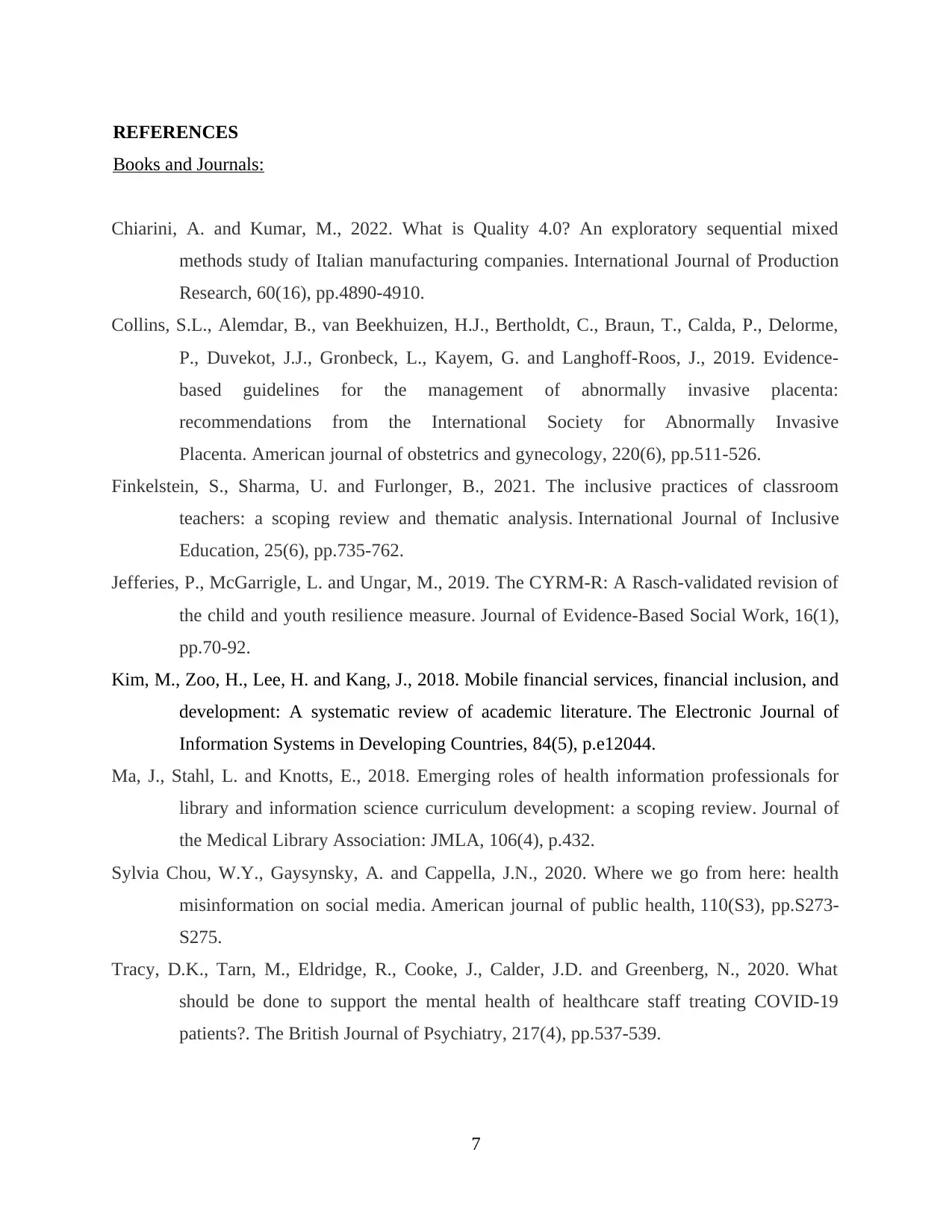
REFERENCES
Books and Journals:
Chiarini, A. and Kumar, M., 2022. What is Quality 4.0? An exploratory sequential mixed
methods study of Italian manufacturing companies. International Journal of Production
Research, 60(16), pp.4890-4910.
Collins, S.L., Alemdar, B., van Beekhuizen, H.J., Bertholdt, C., Braun, T., Calda, P., Delorme,
P., Duvekot, J.J., Gronbeck, L., Kayem, G. and Langhoff-Roos, J., 2019. Evidence-
based guidelines for the management of abnormally invasive placenta:
recommendations from the International Society for Abnormally Invasive
Placenta. American journal of obstetrics and gynecology, 220(6), pp.511-526.
Finkelstein, S., Sharma, U. and Furlonger, B., 2021. The inclusive practices of classroom
teachers: a scoping review and thematic analysis. International Journal of Inclusive
Education, 25(6), pp.735-762.
Jefferies, P., McGarrigle, L. and Ungar, M., 2019. The CYRM-R: A Rasch-validated revision of
the child and youth resilience measure. Journal of Evidence-Based Social Work, 16(1),
pp.70-92.
Kim, M., Zoo, H., Lee, H. and Kang, J., 2018. Mobile financial services, financial inclusion, and
development: A systematic review of academic literature. The Electronic Journal of
Information Systems in Developing Countries, 84(5), p.e12044.
Ma, J., Stahl, L. and Knotts, E., 2018. Emerging roles of health information professionals for
library and information science curriculum development: a scoping review. Journal of
the Medical Library Association: JMLA, 106(4), p.432.
Sylvia Chou, W.Y., Gaysynsky, A. and Cappella, J.N., 2020. Where we go from here: health
misinformation on social media. American journal of public health, 110(S3), pp.S273-
S275.
Tracy, D.K., Tarn, M., Eldridge, R., Cooke, J., Calder, J.D. and Greenberg, N., 2020. What
should be done to support the mental health of healthcare staff treating COVID-19
patients?. The British Journal of Psychiatry, 217(4), pp.537-539.
7
Books and Journals:
Chiarini, A. and Kumar, M., 2022. What is Quality 4.0? An exploratory sequential mixed
methods study of Italian manufacturing companies. International Journal of Production
Research, 60(16), pp.4890-4910.
Collins, S.L., Alemdar, B., van Beekhuizen, H.J., Bertholdt, C., Braun, T., Calda, P., Delorme,
P., Duvekot, J.J., Gronbeck, L., Kayem, G. and Langhoff-Roos, J., 2019. Evidence-
based guidelines for the management of abnormally invasive placenta:
recommendations from the International Society for Abnormally Invasive
Placenta. American journal of obstetrics and gynecology, 220(6), pp.511-526.
Finkelstein, S., Sharma, U. and Furlonger, B., 2021. The inclusive practices of classroom
teachers: a scoping review and thematic analysis. International Journal of Inclusive
Education, 25(6), pp.735-762.
Jefferies, P., McGarrigle, L. and Ungar, M., 2019. The CYRM-R: A Rasch-validated revision of
the child and youth resilience measure. Journal of Evidence-Based Social Work, 16(1),
pp.70-92.
Kim, M., Zoo, H., Lee, H. and Kang, J., 2018. Mobile financial services, financial inclusion, and
development: A systematic review of academic literature. The Electronic Journal of
Information Systems in Developing Countries, 84(5), p.e12044.
Ma, J., Stahl, L. and Knotts, E., 2018. Emerging roles of health information professionals for
library and information science curriculum development: a scoping review. Journal of
the Medical Library Association: JMLA, 106(4), p.432.
Sylvia Chou, W.Y., Gaysynsky, A. and Cappella, J.N., 2020. Where we go from here: health
misinformation on social media. American journal of public health, 110(S3), pp.S273-
S275.
Tracy, D.K., Tarn, M., Eldridge, R., Cooke, J., Calder, J.D. and Greenberg, N., 2020. What
should be done to support the mental health of healthcare staff treating COVID-19
patients?. The British Journal of Psychiatry, 217(4), pp.537-539.
7
⊘ This is a preview!⊘
Do you want full access?
Subscribe today to unlock all pages.

Trusted by 1+ million students worldwide
1 out of 9
Related Documents
Your All-in-One AI-Powered Toolkit for Academic Success.
+13062052269
info@desklib.com
Available 24*7 on WhatsApp / Email
![[object Object]](/_next/static/media/star-bottom.7253800d.svg)
Unlock your academic potential
Copyright © 2020–2026 A2Z Services. All Rights Reserved. Developed and managed by ZUCOL.




